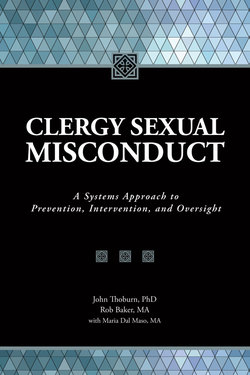Читать книгу Clergy Sexual Misconduct - John Thoburn Thoburn - Страница 10
На сайте Литреса книга снята с продажи.
Intrapersonal Context
ОглавлениеThe story of David and Bathsheba provides a useful context for understanding the systemic nature of clergy sexual misconduct, one which recognizes the interlocking subsystems of cultural zeitgeist, personal insecurities, unrequited relationships, career burnout, and lust. The story is the quintessential cautionary tale for the Church, as the story of King David powerfully illuminates the consequences of sexual misconduct by religious leaders. (The story of David is discussed further in chapter 4). While David inhabited the role of warrior, he was paradoxically experiencing a time of peace as king. He struggled with integrating the ego-burnishing conqueror’s life with the more mundane life as head of state. The loneliness of his shepherd’s childhood and a nagging sense that he was a country rube and not royal material resulted in his inability to balance the carefully constructed theocentric life he had created with the loneliness of being king. Thus, everything David held dear disintegrated from his deep-seated insecurities and self-absorbed ambitions. Many ministers have personality factors that contribute to feelings of inadequacy. Some ministers have narcissistic features, including intense and chronic feelings of shame and rejection that manifest in low self-confidence and the need for positive input from their congregations (Francis & Baldo, 1998; Thoburn & Balswick, 1998). Insecure attachment can occur in a child when he or she lacks a sense of safety, security, and soothing in his or her life; this can lead to deregulation in the mesolimbic-cortical-dopaminergic brain system. This imbalance in brain function can motivate people to seek pleasure or self-soothing activities that involve the midbrain and limbic areas of the brain where dopamine is produced and potentially inappropriate pleasure-based activities are cultivated and reinforced (Lustyk, 2010).
An insecure, anxious orientation to life can result in an increased need for pleasure-inducing stimulation for the release of dopamine, a feeling of misery when the dopamine-stimulating pleasurable activity is absent, and a disconnection from the prefrontal cortex and subsequent reduction in executive functions such as decision making and impulse control (Lustyk, 2010). Some ministers will go to great lengths for strokes and accolades that produce this temporal pleasure, and they may become unbalanced in their lives, devoting more time to performance-oriented ministry and less time to their marriage and family, losing intimacy with their spouses. When a pastor engages these primarily self-focused coping patterns, he will not allow himself to be known and therefore cannot be intimate with his spouse. Instead, he is at risk to seek pseudo-intimacy in a physical relationship meant to soothe his need for attention, stroke his ego through conquest, and gain a sense of safe closeness through sex.
The ministry is a lonely calling, with 70 percent of a representative sampling of pastors reporting that they have no close friends and 45 percent acknowledging career burnout (Steinke, 2006). The average age at which pastors act out with extramarital sexual activity is their early forties (as with other helping professions) (Butler & Zelen, 1977); the average age at which pastors experience burnout is in their early forties as well (Steinke, 2006; Thoburn & Balswick, 1998). The pastors who are more prone to burnout are those who are afraid of intimacy, who overwork out of fears of failure or rejection, or who put their emotional and physical energy into their careers because things are not going well at home. Ultimately, this sense of burnout can lead a pastor to feel resentment toward parishioners and disregard for congregational needs; the pastor may come to view church members as objects rather than persons. When burnout occurs, a pastor may feel anger and fatigue, and have little motivation for spiritual disciplines or accountability. As Wilson and Hoffman (2007, p. 34) stated, “The most miserable people in the world are Christians whose intimacy with God has gone cold.” The combination of loneliness, unbalance, narcissism, lack of accountability to God or man, and burnout creates the perfect storm for lust and sexual misconduct to occur.
Eventually, David was forced to face his demons and understand how the good shepherd had come to engage in the devastatingly harmful behaviors of adultery, murder, and deceit. The reality of his actions—the hurt, pain, and destruction he had caused—were brought front and center through the intervention of Nathan (2 Samuel 12:1–6). The prophets of Israel held a unique place in society; they stood outside the system and, therefore, were able to exhort, rebuke, provide wise counsel, and offer avenues for absolution and reconciliation with God. When a pastor is caught in sexual misconduct, it usually is preceded by a long-standing and pervasive history of illicit behavior. Evaluation and treatment is best administered by someone outside the Church, but this person must understand the unique role of the minister. This outside person must be unbiased and completely honest with the pastor who can, in turn, be completely honest without fear of retribution. Chapters 2 and 5 further discuss issues of evaluation, treatment, and oversight by the local Church and denominational conferences.
